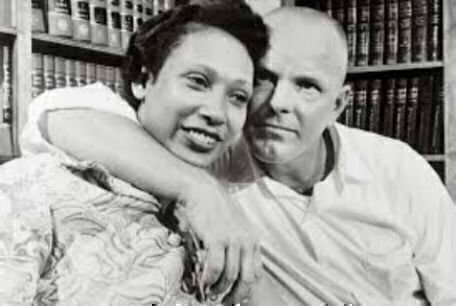On April 10, 1967, the United States Supreme Court held oral arguments in a landmark case about a Virginia law that said marriages between races should be treated as a felony.
 Anti-miscegenation laws, or statutes barring interracial marriages, had been on the books of some states pre-dating the Constitution. In 1883, in Pace v. State of Alabama, a unanimous Supreme Court upheld an Alabama law that applied to interracial consensual relationships. Writing for the Court, Justice Stephen Johnson Field said the law penalizing living together “in adultery or fornication” could prescribe harsher punishment for a relationship between people of two races than members of the same race.
Anti-miscegenation laws, or statutes barring interracial marriages, had been on the books of some states pre-dating the Constitution. In 1883, in Pace v. State of Alabama, a unanimous Supreme Court upheld an Alabama law that applied to interracial consensual relationships. Writing for the Court, Justice Stephen Johnson Field said the law penalizing living together “in adultery or fornication” could prescribe harsher punishment for a relationship between people of two races than members of the same race.
In the case of Loving v. Virginia, the state of Virginia had found that Richard Loving, who was white, and Mildred Jeter, who was Black, had violated its anti-miscegenation statute when the couple returned to Virginia to live after they were married in the District of Columbia in 1958. The Lovings were indicted by a grand jury in Virginia and sentenced to one year in jail. The judge suspended the sentence on the condition that couple moved out of the state for 25 years.
The Lovings then moved to the District of Columbia and later started the legal process to contest the convictions under the federal Constitution’s 14th Amendment Due Process and Equal Protection clauses. Virginia’s state Supreme Court upheld the anti-miscegenation law and the convictions and the Lovings appealed to the Supreme Court.
Two attorneys representing the Lovings, Bernard S. Cohen and Philip Hirschkop from the American Civil Liberties Union, were first to present their argument to the Court.
Link: Read Court Transcript Selections
Hirschkop argued the Equal Protection claim supporting the Lovings. “You have before you today what we consider the most odious of the segregation laws and the slavery laws, and our view of this law, we hope to clearly show, is that this is a slavery law," Hirschkop said in his opening sentence. The Justices had few questions for Hirschkop.
Next came Cohen, who argued the Due Process part of the Loving’s case. Justice Potter Stewart had asked targeted questions about the ability of states to regulate marriages between first cousins. After Cohen finished, Virginia Assistant Attorney General R. D. McIlwaine III faced a tougher line of questions from the Court.
“We take the position that these are the only statutes before the Court, and anything that may have to do with any other provision of the Virginia Code which imposes a prohibition on the white race only or has to do with certificates of racial composition, whatever they may be, are not properly before this Court,” McIlwaine said. “This is a statute which applies to a Virginia situation and forbids the intermarriage of the white and colored races.”
Chief Justice Earl Warren asked why the Virginia statute did not apply to “North American Indians.” Warren then questioned McIlwaine’s claim that the debates in Congress prior to the 14th Amendment’s ratification indicated the amendment’s framers excluded a clause about interracial marriages.
McIlwaine also cited a book from Dr. Albert I. Gordon about the effects of interracial marriages on society. “We do say that he personally and clearly expresses his view as a social scientist that interracial marriages are definitely undesirable, that they hold no promise for a bright and happy future for mankind.”
Justice Hugo Black then focused on a core question—whether the law was written to protect white supremacy. “Is not the basic premise on which [the statutes] are written that the white people are superior to the colored people and that they should not, therefore, be permitted to marry because it might pollute the white race,” he asked McIlwaine, who acknowledged that was the original lawmakers’ intent in Virginia.
“I do not see how that can affect the constitutional problem which is presented to this Court where an enactment of the General Assembly of Virginia is on trial in which we submit was beyond the scope of the 14th Amendment,” McIlwaine added.
On June 12, 1967, a unanimous Supreme Court ruled in favor of the Lovings. “This case presents a constitutional question never addressed by this Court: whether a statutory scheme adopted by the State of Virginia to prevent marriages between persons solely on the basis of racial classifications violates the Equal Protection and Due Process Clauses of the 14th Amendment,” wrote Chief Justice Warren. “For reasons which seem to us to reflect the central meaning of those constitutional commands, we conclude that these statutes cannot stand consistently with the 14th Amendment.”
“The 14th Amendment requires that the freedom of choice to marry not be restricted by invidious racial discriminations. Under our Constitution, the freedom to marry, or not marry, a person of another race resides with the individual, and cannot be infringed by the State,” Warren concluded.







